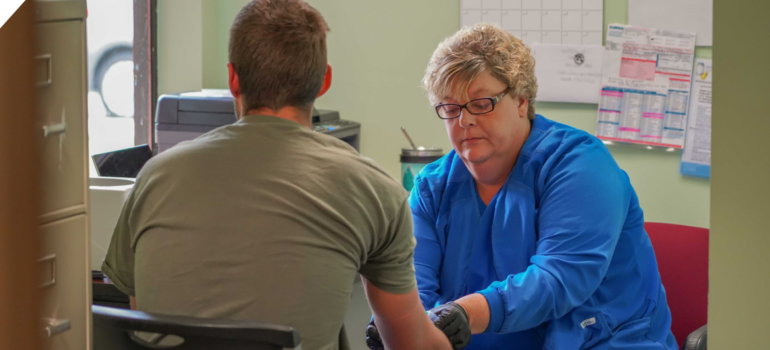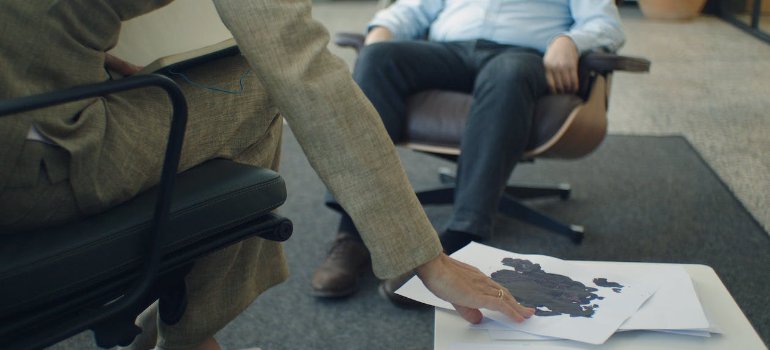Individual Therapy
Learn more about the power of individual therapy in your journey toward lasting healing and sobriety with Harmony Ridge Recovery.
The word “psychotherapy” comes from the Greek words for “soul” and “healing;” “psyche” and “therapeia.” True to its name, this timeless technique has helped millions of people worldwide face their problems and heal their souls. Therapy can help you overcome certain behaviors and become an overall better person.
In the case of addiction treatment, therapy is an important and even necessary part of recovery. Individual therapy for addiction will guide you through your sobriety journey and help you work through any other trauma in your life.
If the two seem unconnected, sadly they’re not. The National Institute of Mental Health finds that 1 in 5 people in the U.S. has a mental health disorder. In addition, a large percentage of these individuals also struggle with co-occurring addiction or Substance Use Disorders (SUDs).

If this is the case for you or your loved ones, you are not alone. Join us today, as we explore how individual therapy can help you through mental illnesses and addiction.
What is Individual Therapy?
Individual therapy is a psychological method that involves you and a mental health counselor or psychiatrist. Individual therapy comes in many different styles and formats, but talk therapy is the most popular form. People in individual therapy discuss anything that’s concerning them, including career changes, divorce, loss, and addiction. Everything you say in individual therapy is confidential.
Ancient Greeks are believed to be some of the first to observe mental health disorders as both mental and physical conditions.
However, it wasn’t until the late 1700s that mental health treatment became more humane. The first asylum in North America was founded in 1773, and many towns had them by the end of the 19th century. Unfortunately, a culture of institutionalization stemmed from this, and many people in asylums weren’t allowed to leave. As a result, staff used restraints and violence on patients.

During the 20th century, individual therapy for addiction truly began to thrive as it took a more positive direction. By 1913, behaviorist John B. Watson had laid the foundations for behavioral psychoanalysis. Cognitivism, systems psychology, and behaviorism began to take hold, and Sigmund Freud’s talk approach became the foundation for psychoanalysis.
Simultaneously, Dr. Aaron T. Beck’s psychoanalytic experiments on cognitive distortions fathered Cognitive Behavioral Therapy (CBT). While the two are not identical in form or function, they share the same goal in individual therapy; to heal the soul.
Today, individual therapy has become widely accepted throughout various parts of the world as a key component of addiction treatment. As a result, it sees applications throughout different levels of care, from inpatient programs to aftercare.
What to Expect in Individual Therapy
Your first individual therapy session will be one of planning and goal-setting. You and your counselor will talk about how you’ll achieve these goals, what concerns have brought you to therapy, and how many sessions you’ll need. Your therapist will also get to know you better and ask you questions about your physical and mental health. Knowing your background will help in your therapy approach and plan for treatment.
You should also use this session to figure out if your therapist is a good fit for your needs. Whether you’re seeking individual therapy for addiction or general well-being, it’s important that you feel comfortable opening up. A good relationship is vital for achieving your goals. If something feels off or isn’t right, try looking for a different counselor.

The following sessions will focus on the issues you’ve decided to discuss. You’ll explore past trauma and other experiences that could have led to bad habits. It can be hard to open up to your counselor and delve into your past. Don’t be surprised if at times you become emotional, distraught, or angry during your sessions. However, this is necessary if you want to overcome your fears, learn from your mistakes, and become a better person.
Your therapist will provide you with tools and even homework to help you confront your problems. As your sessions go on, you’re likely to start developing healthier coping skills and more positive thinking patterns. You’ll learn to judge less and be more tolerant of people around you.
How Long Does Individual Therapy Last?
Individual therapy sessions last anywhere from 45 to 60 minutes. The length of your time in individual therapy depends on how much you’ve abused your substance of choice. Some people stay in therapy for the rest of their lives so they can keep themselves accountable.
What Are the Benefits of Individual Therapy?
Individual therapy, regardless of its type, has ample benefits for the individual. The most notable ones in this context are the following.
Healthier Coping Skills
If you’ve recently lost your job or a loved one, or you’re struggling with a mental health disorder and addiction, individual therapy can teach you how to cope. These coping skills rely on science and evidence-based techniques and will stay with you long after you’ve finished treatment.

Fewer Relapses
Relapse is a large concern in addiction treatment. The National Institute on Drug Abuse (NIDA) finds that 40-60% of those with SUDs may relapse. When you relapse, you start using again after months or even years of sobriety. Relapse doesn’t just happen, though. It’s a three-stage process that begins through physical and emotional triggers. These include places where you used to take drugs, as well as stress and anxiety that could drive you to use.
Individual therapy does wonders in preventing relapses since it helps you identify your triggers. When you know what these are, you can avoid them and stay in control of your recovery and sobriety.
Better Control of Emotions
When you control your emotions, you can respond to situations with calmness and intelligence. Addiction, from everyday life with SUDs to post medical detox cravings, can be very emotionally challenging. In this regard, emotion regulation will improve your relationships with those you care about most and safeguard your recovery.
Better Understanding of Self
Therapy helps you learn more about your patterns and qualities. Through each session, individual therapy for addiction will offer you more understanding and self-awareness. This can help you avoid certain negative behaviors to which you normally gravitate, and cement your recovery.
Types of Individual Therapy
The type of individual therapy on which you embark depends on your current situation. There is always an appropriate kind of therapy for every struggle, and your addiction treatment providers should always personalize therapy. Read more about the different types to figure out which one you think best relates to your struggle.

Talk Therapy
Talk therapy is the most common type of individual therapy, and the term colloquially refers to most types of psychotherapy. The theory behind this is that talking about what’s bothering you can help you gain perspective and clarity.
Talk therapy is a broad field of practice that can include a number of methods, including Cognitive Behavioral Therapy (CBT). For a deeper explanation of CBT and other forms of therapy, please read on.
Cognitive Behavioral Therapy
Cognitive Behavioral Therapy (CBT) is a type of therapy that focuses on cognition, thoughts, and behaviors. Rather than focusing on your past, CBT looks at where you are right now. Practitioners of CBT believe that negative thoughts and behaviors have led you to make decisions that have hindered your well-being. By replacing these feelings and thoughts with positive ones, you’ll make more productive decisions that benefit you in the long run.
For many treatment providers, it has become largely synonymous with individual therapy for addiction. CBT has become a popular form of therapy in addiction treatment due to its demonstrable effectiveness, as NIH research finds:
“[CBT] for substance use disorders has demonstrated efficacy as both a monotherapy and as part of combination treatment strategies. […] Evidence also supports the durability of treatment effects over time.”
Dialectical Behavior Therapy
Dialectical Behavior Therapy (DBT) is a type of CBT, but this one centers around improving relationships. People who have trouble regulating their emotions learn how to control them and communicate more effectively with others. If you’re struggling with addiction, you likely know for yourself how it can sever relationships due to emotional instability. This is what DBT focuses on, helping you mend these bonds.

Marsha M. Linehan developed DBT in the 1980s as a way to treat borderline personality disorder (BPD). Since then, it’s also become useful in treating substance use disorder and other mental health conditions. In fact, the National Center for Biotechnology Information (NCBI) finds it an excellent resort for more severe cases of addiction:
“DBT, a treatment originally developed by Dr. Linehan that is efficacious for chronically suicidal patients with BPD, has been adapted for this patient population. […] DBT and its adaptation may also be effective for SUD patients with multiple, complex problems rooted in emotional dyscontrol who have not responded to other evidence-based approaches.”
Rational Emotive Behavior Therapy (REBT)
Rational Emotive Behavior Therapy (REBT) is often considered a type of CBT, but it follows its own principles. As a type of individual therapy for addiction, it is a powerful, action-oriented approach that addresses negative thought patterns. Your therapist identifies irrational, negative thoughts, explores their roots and works with you to replace them with positive, constructive ones.
REBT sees use far beyond just addiction treatment, as it’s a potent psychotherapy tool in general. Therapists use it to treat insomnia, aggression, and other ailments and disorders. It’s this potency that makes it ideal for addiction treatment as well, especially for more severe cases. NCBI research confirms its effectiveness for even such serious disorders as PTSD:
“[REBT] demonstrated reductions in PTSD symptoms that were comparable to a PTSD treatment as usual[.] Reductions in depression and anxiety were also present. […] [REBT] can significantly reduce symptoms and may be beneficial to expand to other civilian, military, or VA medical centers.”
Motivational Interviewing (MI)
Motivational Interviewing (MI) is another type of individual therapy, often synonymous with talk therapy. First described in 1983 by Professor William R. Miller, Ph.D., this type of therapy seeks to motivate, inspire hope, and reduce self-doubt. MI sessions are led by the patient, not the therapist, so this type of therapy requires a strong patient-therapist bond.

This is a very potent type of individual therapy for addiction, according to NCBI findings:
“These outcomes include reducing binge drinking, frequency and quantity of alcohol consumption, substance abuse in people with dependency or addiction, and increasing physical activity participation.”
Interpersonal Therapy
Like DBT, Interpersonal Therapy (IPT) also builds relationship skills. IPT uses communication and attachment theories to improve bonds with friends and loved ones. Your counselor will focus on your most pressing relationship issues and use role-playing to help you grow your communication skills. IPT has been known to work well for people with depression.
How Can Individual Therapy Help With Addiction?
In many treatment centers, individual therapy is required in addiction recovery. This is because substance use disorder is much more than a physical dependence on drugs and alcohol. These substances have changed the way your brain works. For so long, you’ve felt that you needed these to feel better about yourself and deal with your problems. Even after you go through detox to rid your body of physical dependence, you still need to change the way you think about substances.
As mentioned earlier, individual therapy for addiction helps you identify physical, mental, emotional, and environmental triggers that can lead to relapse. When you learn your specific triggers, you can learn how to avoid them and stay sober. Even if you can’t avoid every trigger, you can at least know how to deal with one when you encounter it.

Which Substance Addictions Can Individual Therapy Help Treat?
Because of its different types and range of applications, individual therapy can see use in treatment programs for most substances. Notable examples include:
- Cocaine addiction. Cocaine is a powerful, highly addictive drug, so cocaine addiction rehab often has to include individual therapy.
- Fentanyl addiction. A highly addictive illicit substance with a high potential for misuse, fentanyl often requires individual therapy as early as during fentanyl detox treatment.
- Heroin addiction. Addictive like few other substances, heroin has made heroin rehab centers across the country employ individual therapy to combat it.
- Ambien addiction. While relatively less challenging, if only by comparison, Ambien rehab also commonly employs individual therapy to great effect.
- Barbiturates addiction. Barbiturates are powerful depressants with a high potential for addiction, which often requires tailored barbiturates rehab to address.
- Benzodiazepine addiction. Often dubbed as “benzos”, these depressants typically require focused benzo rehab to break free.
- Marijuana addiction. While far more socially acceptable, marijuana is also notably addictive; virtually every marijuana rehab center will offer individual therapy for addiction to it.
- Stimulants addiction. The opposite of depressants but no less addictive, stimulants can fuel SUDs like every stimulants addiction rehab center will attest to.
- Opiates addiction. A subgroup of opioids, opiates are notoriously dangerous if addicted to and require individual therapy at an experienced opiate rehab center to overcome.
- Methamphetamine addiction. Often dubbed as “meth”, methamphetamine is a notoriously addictive drug that meth rehab center West Virginia providers are familiar with, which thankfully responds well to individual therapy.
With enough progress, most such programs will typically then explore group therapy options when the patient is ready.

Individual Therapy and Co-Occurring Disorders
About 8 million people in the U.S. deal with both an addiction and a co-occurring mental health disorder. This is called dual diagnosis and can have SUDs overlap with such mental health disorders as:
- Anxiety
- Bipolar disorder
- Depression
- Eating disorders
- Personality disorders and borderline personality disorders
- Schizophrenia
- Trauma
- Autism
- OCD
- ADHD
- PTSD
Unfortunately, this phenomenon is very common, according to NIDA’s findings:
- 7 million adults have co-occurring mental and substance use disorders. This doesn’t mean that one caused the other and it can be difficult to determine which came first.
- Of the 20.3 million adults with substance use disorders, 9% also had mental illnesses.
- Among the 42.1 million adults with mental illness, 2% also had substance use disorders.
When you have feelings of anguish and despair, it’s natural for you to look for a solution. Although using drugs and alcohol might seem like an easy answer to your problems, it’s only temporary and makes them worse. These substances are only masking what you feel inside. The only way they can be managed is with the group or individual therapy for addiction and, sometimes, medication.

To achieve full recovery, both addictions and mental health disorders need to be treated at the same time. Simultaneous treatment will ensure that you receive the proper help for your conditions. This will also help our clinicians get to the root of your addiction.
Is Individual Therapy Right for Me?
If you’re dealing with troubles that interfere with your everyday life, individual therapy might be the best option. Individual therapy Is also helpful if you’re struggling with any of the following conditions or issues:
- Addiction
- Anxiety
- Eating disorders
- Sexuality
- Family troubles
- Relationship problems
However, some in addiction recovery might find that group therapy works better. Group therapy involves several people like you in a session guided by a mental health counselor. One advantage of group therapy is that it provides a support system, and your peers will challenge you to do better. Some people find that a mixture of both individual and group therapy can be a recipe for success.
The stigma of mental health might keep some people from talking about their problems. There are many who believe that therapy is for “crazy” people. Here are a few other reasons why people might be reluctant to attend individual therapy:
- Not wanting to acknowledge that anything is wrong in their lives
- Feeling shame when talking about past trauma
- Fearing that conversations won’t stay confidential
- Not being able to afford the cost
For therapy to be effective, you must attend every session, even when you don’t feel like it. The more you attend, the more you’ll get out of it and the better you’ll feel. Therapy requires commitment and determination from you and your counselor.
Individual Therapy for Addiction Treatment at Harmony Ridge

Our dedicated therapists at Harmony Ridge Recovery Center are all licensed with the proper credentials. They’re trained in addiction recovery and can help you work through your substance use disorder. We also have numerous aftercare programs and alternative therapy methods, including yoga, tai chi, and art therapy, that will help you connect with your inner self.
Addiction is no match for the strength you have inside. You have the power to overcome and manage it and stay sober. With help from Harmony Ridge, you can achieve all of your goals and more. Reach out to us today to learn more!
Jump To Section
Begin Your Journey to Healing Here
Ask me about recovery, I can help you!
Our recovery specialists are standing by 24/7 to help you or your loved one.
Or call us: 


